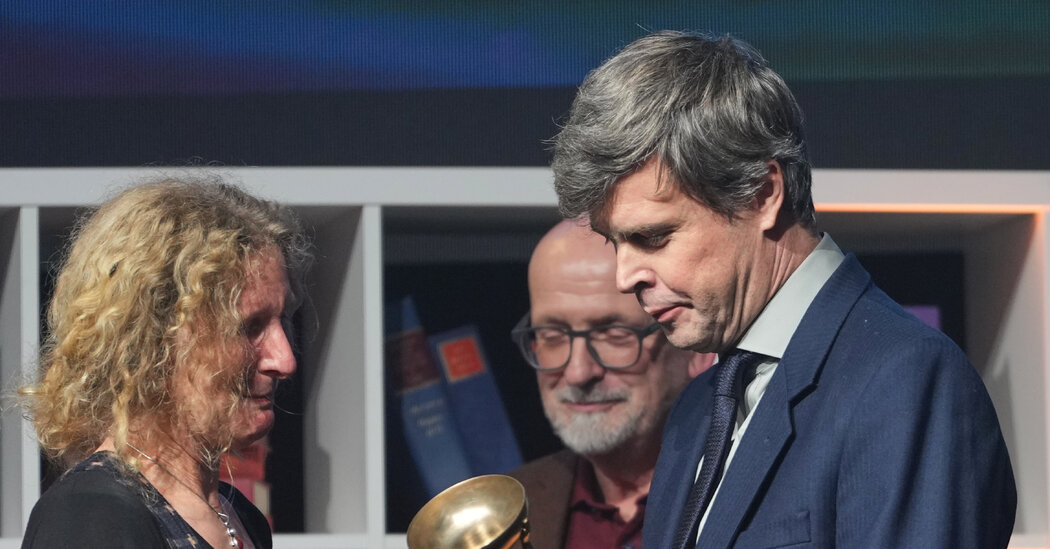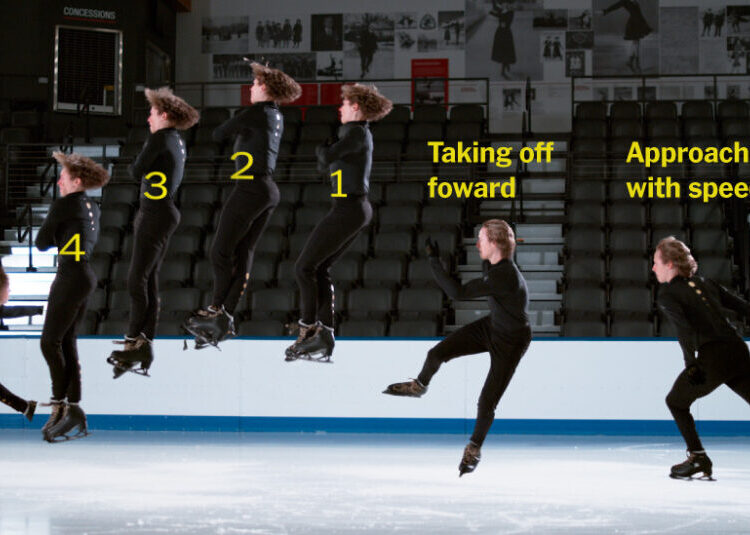
Cultural poverty and lonely men
There are many books I love that proudly show off Dwight Garner’s endorsement. Sally Rooney’s “Intermezzo.” Percival Everett’s “James.”
And so when “Flesh” by David Szalay won this year’s Booker Prize, the first thing I did was look up Dwight’s review. At first, he didn’t really sell it to me: “To read this cool, remote book,” he wrote, “is to feel you are eyeballing the action on a bank of surveillance cameras.”
He never quite liked the book, he wrote, but he also “admired” it “from front to back.” That intrigued me. As did the subject matter: masculinity under duress. So I called him up and asked whether I should read it, and why.
Katrin: Tell me a little bit about this book.
Dwight: Well, you know, it’s called “Flesh.” I joke in my review that a better title might have been “Bones” because the book is very remote and chilly. Szalay’s prose is spare, and yet it has that sort of rich spareness of someone like Ernest Hemingway.
The book is about this diffident and lonely young man who grows up on a housing estate in Hungary and has a rough childhood. He eventually becomes a chauffeur in London for a wealthy family. And he insinuates his way in and begins to have an affair with the woman of the house. And before you know it, he’s wearing Tom Ford suits and flying on private jets. It’s a very complicated plot. But it’s largely about male friendship and the lack of it.
This concept of alienated manhood — does that capture something about our world today?
I think it does. You get the sense that this guy probably played too many video games when he was a kid. There’s a blankness to him that seems to come not just from poverty but also from cultural poverty. The kinds of things he’s had to feed his mind are very limited. And there’s just nowhere for him and the other men in this book to connect.
We’re living in this world now that lacks moral champions, and this book makes you feel that with almost a physical ache. There’s no one in this book to admire. All the characters are ugly in their own way. There’s no sense that a better education, a better upbringing, makes you a better person. It’s an amoral world that Szalay shows us.
The protagonist is an immigrant. But that sense of cultural alienation is not limited to immigrants.
Yeah, there’s so much longing in this guy. You feel the sadness in him. And part of that is just being untethered, being far from home. Really sort of having no home to return to.
We’re in kind of an in-between period in world history, and it kind of speaks to an in-between place that I think people feel themselves in, and a kind of uncertainty. The main character stumbles the way we’re all stumbling, but in a darker way. And I think that’s part of what Szalay wants to get at — a sense of rootlessness, or again, to use that phrase, cultural poverty.
I have a 9-year-old son. Your son is in his twenties. Do you think this sort of alienation is something that boys and young men like our sons are particularly grappling with?
My son played video games, but he turned out great! I think in this novel, you had someone who didn’t grow up with some of the benefits that my son had just by having a stable home. This character utterly lacked anyone to look up to. In today’s world, if you don’t have a lot going for you as a young man and all you really have to fall back on are your fists, I think it’s tough to discover what matters to you and what life is about.
Most of the novels I read are written by women, but that’s not by design. Are we seeing a decline in male literary writers?
I do think the action in the literary world has pivoted away, somewhat, from the young male novelist toward the young female novelist. It’s largely been a good development. But then you have someone like David Szalay who comes along and is so excellent at talking about male alienation that you realize you’re kind of missing some of these voices.
Is there a book people could read after this one? A sort of easy read to fall back on?
Absolutely. I’m not steering readers away from this book at all. I’m just warning them that this is a cold, austere read — in great ways. The big page-turning book of this year for me was “What We Can Know,” by Ian McEwan.
MORE TOP NEWS
Pakistan’s spending blitz wins over Trump
Pakistan has turned around its previously rocky relationship with the Trump administration, a shift that has been attributed to shrewd diplomacy by Islamabad.
But Pakistan also signed a series of high-priced contracts with prominent Washington lobbying firms this spring, just weeks before the White House announced favorable new policies that gave the country one of the world’s more enviable tariff rates and an edge over its archrival, India.
The campaign to influence President Trump included employing some of his closest confidants, my colleague Pranav Baskar reports.
OTHER NEWS
- Trump signed a spending bill to reopen the government, ending the longest shutdown in U.S. history.
- France commemorated the 10th anniversary of the 2015 terrorist attacks in Paris, which killed 130 people and injured more than 500.
- With Russia on the verge of capturing the strategic city of Pokrovsk, some commanders say Ukraine may be holding cities longer than it should.
- Israeli settlers burned a mosque in the occupied West Bank amid a surge of extremist violence in the territory.
- Iraq’s prime minister, Mohammed al-Sudani, appeared to lead in the country’s elections, but his vote share may not be big enough to form a government.
- A former Syrian security official was indicted and charged with torture after living in plain sight in Europe for years.
SPORTS
Football: Countries across the globe are fighting to secure the final 20 spots at next year’s World Cup.
Running: Eliud Kipchoge, who made history with a sub-two hour marathon, plans to run seven marathons in seven continents.
COSMIC SHOW OF THE DAY
The Northern Lights
Two blasts of solar material crashed into the Earth’s magnetic bubble in space this week. They caused gorgeous light shows.
MORNING READ
José Antonio Morante Camacho, arguably the greatest bullfighter of his generation, has fought his last bull. Now 46, Morante helped make bullfighting more popular across Spain, especially with younger conservatives. But his personal demons haunted him.
Morante said that fans thank him for destigmatizing mental illness. But, he added with a quivering smile, “it’s harder to stand in front of a bull.” Read more.
AROUND THE WORLD
What they’re watching … in the Faroe Islands
The biggest underdog story in the World Cup qualifying rounds this year? The Faroe Islands.
Tonight, a large chunk of the 55,000 people who live on these rugged green specks in the North Atlantic will be watching their men’s football team face Croatia. The match is about more than just football. The Faroese are fighting to get independence from Denmark. They are autonomous but not sovereign: They don’t have full representation at the U.N., no Olympics team, no Eurovision act. That makes this a chance to show the world what they can do and come in even more energized to next year’s independence negotiations with Denmark, their biggest in a generation.
It’s going to be a tough fight. Croatia is one of the best teams in the world. Most of the Faroese squad have day jobs. But if they do pull this off, they will have a tiny chance of making it to the World Cup. (Make that teeny tiny. Because of qualifying nuances, Gibraltar would also have to beat the Czech Republic, which is unlikely.)
“We know it’s a small belief,” one player told me at the car dealership where he works. But they still have to believe, he said: “That’s the only way. You need to think big and go for it.” — Amelia Nierenberg, reporting from the Faroes
RECIPE
In 16th-century Constantinople, now Istanbul, the royal palace employed so many pastry chefs that they had their own dedicated mosque. No treat was more celebrated than baklava.
The syrupy pastry’s origins are often debated: Iran, Azerbaijan and Greece have all claimed credit. But most food scholars agree that the main building-block of the dish — the thin pastry known in Turkey as yufka and elsewhere as phyllo — was pioneered by nomadic Turks. Learn to make it from scratch.
WHERE IS THIS?
This glacier has retreated about half a kilometer since 2007, which scientists track with orange dye. Where is it?
- Columbia Glacier, Alaska
- Franz Josef Glacier, New Zealand
- Baltoro Glacier, Pakistan
- Rhône Glacier, Switzerland
BEFORE YOU GO …
This week, I was in France. It felt like a homecoming. I lived in Paris for a decade until 2011, and it was a very happy decade. I always gravitate to the Rue de Bretagne in the Marais, where I lived in a one-bedroom attic apartment overlooking the Marché des Enfants Rouges, a covered market that has been there since 1615. Agathe, the woman running my favorite boutique, is still there. So is my favorite Moroccan restaurant, Chez Omar.
All this contributes to a sense that not much has changed — but of course, it has. I used to cycle to work on precarious streets with no bike lanes. Today, cyclists own the Rue de Rivoli. In 2002, Jean-Marie Le Pen, the late leader of France’s far right, stunned the country when he made it into the runoff of the presidential election. Today, the surprise would be if the party of his daughter Marine Le Pen didn’t make the next runoff.
I want to recommend one film and one book that have helped me understand France. The film, La Haine, from 1995, chronicles a day and a night in the life of three friends from a housing project outside of Paris where rioting and police racism go hand in hand. Watch this short clip of an unforgettable scene about 35 seconds in.
The book is “Submission” by Michel Houellebecq, published 20 years later. It’s controversial; our reviewer didn’t like it. For me, it captures the deep-seated fear of Islam and Islamization among some in France that has contributed to the rise of the far right.
Finally, as always, my song for the week: Monde Nouveau by Oscar Anton. If you want a little glimpse of my old neighborhood, click on the video: Oscar is cycling past the Rue Volta in the Marais, about three minutes from where I used to live! I hope you enjoy this tune — it’s gentle and daydream-y, and, for me, at least a little nostalgic.
Bon weekend! — Katrin
TIME TO PLAY
Here are today’s Spelling Bee, Mini Crossword, Wordle and Sudoku. Find all our games here.
We welcome your feedback. Send us your suggestions at [email protected].
Katrin Bennhold is the host of The World, the flagship global newsletter of The New York Times.
The post Of Books and Men appeared first on New York Times.



